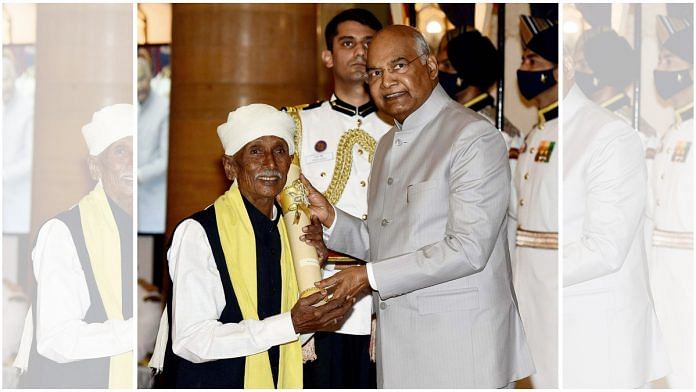Hyderabad: Kanaka Raju has basked in glory since his name made it to this year’s list of Padma Shri awardees, announced in January. The 80-year old from Telangana is an exponent of the adivasi dance form Gussadi. He travelled to Delhi last week to collect the fourth-highest civilian award for the arts, although at first, he had little idea what it meant. And for him, the most exciting part of the trip was boarding a plane for the first time in his life.
Raju, who is from Marlawai village, Jainoor Mandal in Komaram Bheem Asifabad district, has practised Gussadi, performed mostly by his Raj Gond tribe, for more than six decades. He has also been teaching the younger generation for more than 40 years as part of his desperate efforts to keep the folk dance alive, and emphasised the need for support from the government to save the tradition.
What was the most exciting part of his trip to Delhi? “I boarded a flight for the first time, I saw clouds – it felt so nice. I will remember it forever,” he told ThePrint over the phone.
This isn’t Raju’s first trip to the capital, however. He has led cultural troupes there, with young adivasi dancers he had trained, and performed as part of Republic Day celebrations in the Andhra Pradesh state tableau in front of former President A.P.J Abdul Kalam and former Prime Minister Indira Gandhi.
Also read: ‘People’s Padma’ Awards shows the best of India, and not just the elite
Eking out a living
Gussadi is performed only by the men of the tribe. Associated with a local deity, it is staged during the Dandari festival, which usually begins after Deepavali and goes on for 10 days. The dancers wear a cap made of around 1,500 peacock feathers, locally known as mal boora, and wrap animal skin around their waists.
The young men who perform also have a chance to impress women and find a prospective life partner.
However, Gussadi has never brought financial rewards. “I come from a very poor background. During my childhood, we didn’t even have clothes to wear till we were eight years old and were mostly naked. I spent most of my life in forests. This art form has been there since my great-grandfather’s time,” said Raju, who learnt the dance his father.
His situation is no better now — he barely ekes out a living for his 11-member family.
Also read: State teams, foreign troupes, happy crowd — snippets from Chhattisgarh’s tribal dance festival
PM Modi spoke to me, told me ‘achha khao’, ‘don’t be shy’
Raju was the only recipient of the Padma Shri from Telangana this year. But at first, he had little idea what this meant.
“I didn’t know how prestigious this honour was and what the award meant. After it was announced, people started congratulating me. Then there was a lot of media coverage. I was told I would have to go to Delhi, and started getting a lot of calls,” he said.
He added, “I was later told about its importance and I am very happy. Perhaps I still don’t fully understand what it means, but I know now that this art form has obtained recognition across the country through this award.”
Raju, who didn’t interact with his fellow awardees, said he was ‘delighted’ when Prime Minister Narendra Modi spoke to him.
“We were all in the dining area and the Prime Minister came from behind. He said to me, ‘Don’t be shy, achha khao (eat well).’ He also told a group of us that we should be proud of ourselves as we had made it till there purely on our skill, and there was no reason to feel self-conscious. I was so happy, I responded in Hindi. I told him I could speak in Hindi,” an ecstatic Raju told ThePrint, recollecting a memory that he called the best of his lifetime.
Fame is nothing new to Raju. The villages in the region know him as ‘master’ for teaching hundreds of youngsters the art form and his efforts to make sure it doesn’t die out. He’s so strongly associated with the dance in the area that ‘Gussadi’ has been attached to his family name. He has received several awards from the state government over the past few years, and earlier this month, the Telangana government released a grant of Rs. 1 crore for the performance of the dance during the Dandari festival.
However, the Padma Shri recognition has introduced Raju and Gussadi to the country at large. “This award has introduced me and my tradition to the country. I just want the government to help us continue this traditional dance form and not let it die. The government should support us financially and in all ways to continue this tradition — that’s all I want,” said Raju.
(Edited by Rohan Manoj)
Also read: This ancient Telangana folk artform was struggling to survive. Then Covid pushed it to edge



